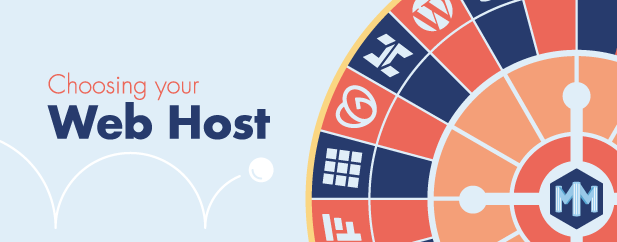Choosing A Web Host

If you want your website to stand out, there is a good chance that you have sunk a lot of time and energy into making it look great. Your content and design are on point and your site is optimized for searches – so now what? It’s time to go live! But that might be easier said than done as there are so many web hosting service providers to choose from. If you aren’t sure which web hosting provider to go with, you are in the right place. Below I will go over some things to look out for when you are choosing a web host.
There are always multiple varying factors that will change based on each individual website (e.g. audience location, how much traffic you are expecting), and this may influence which web host service that you choose to go with. But, when it comes down to it, the four main items that everyone should look for in a good web host are speed, reliability, scalability, and security. I’ll go through each one below.
Speed
When you talk about a website’s speed, you are most likely talking about how fast your site will load. A good service speed will allow your content to load quickly on the browsers of all site visitors, no matter where they are accessing your site from.
If your website’s files are hosted on one server in one place, the speed will decrease as the visitor gets further and further away from that server. The solution to this is store and distribute the assets in a content distribution network (CDN). CDNs distribute your files through data centres across the world and will deliver your content to your visitors via the data centre that is closest to them. Look out for at least one, if not two, CDNs if you want the fastest speeds.
Reliability
How can anyone view your website if it doesn’t load? One of the most key elements that your web host should offer is 99.99% reliability. If your web host is constantly scheduling “down time” or a shared server can’t handle spikes in traffic, this can damage your website’s success. At the end of the day, down time equals missed opportunities for potential customers to visit and view your site.
Scalability
Scalability goes hand in hand with reliability. This element looks at how well your site handles a higher than normal amount of web traffic, and what your server does when it gets an overload of requests. The best web hosting services will automatically spin up servers in response to traffic flow, so your site will be able to handle any amount of traffic. This means that if your brand goes viral, your website won’t crash.
Security
Lastly, security should always be on your mind when it comes to the web. When a website URL starts with “http://”, it is not secure. On the other hand, websites that begin with “https://” show an indication that all communication between your web browser and the website itself are encrypted with an SSL certificate. It’s useful to note that some browsers will show a lock icon instead of “https://” to indicate that the website is secure.
Security is especially essential for any websites that collect personal information of any kind. SSL certificates not only help keep this data secure, but they also impact your Google rankings. Sites without an SSL certificate rank lower, so if you are serious about improving your rankings you will want to look out for a web host that promises and delivers security.
While those are the four main items that you should definitely look out for in a web host, there are also other bonus features that can impact your website’s SEO and performance. These should be seen as non-essential but “nice to haves”. I’ve listed those below.
- HTTP/2: the newest version of the hypertext transfer protocol brings faster websites, but not all hosting platforms support it yet. If you are able to find a web host that does offer it, it could be worth it as there is evidence that Google may be including HTTP/2 in their ranking algorithm. With features like multiplexing and header compression, HTTP/2 is worth searching out.
- Auto backups and version control: This will stop you from losing valuable changes made to your site!
- Site-wide/per page password protection: To help your passwords stay secure.
- Simple publishing workflow: This makes it easy to publish on your site so you can spend your time doing more important things like building your brand.
- DDoS attack protection: Distributed denial of service (DDoS) attacks are malicious attempts to disrupt normal traffic. They can be serious – so it might be nice to have protection from these attacks included in your web hosting service.
After reading this article you should have a pretty clear idea of which web hosting service you want to go with. Never be afraid to ask potential service providers lots of questions when it comes to speed, reliability, scalability, and security. Still not sure which web host to go with? I am happy to answer questions about web hosting, website design, or SEO – contact me to get started.
